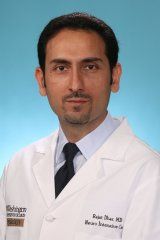News
Article
Thyroid Hormone Administration Provides No Benefit on Transplant Rate, Graft Survival for Brain-Dead Donor Hearts
Author(s):
A trial randomizing brain-dead donor hearts to levothyroxine administration or saline has returned results challenging conventional wisdom on the topic, with data indicating thyroid hormone administration may provide no significant benefit.
Raj Dhar, MD
Credit: Washington University School of Medicine

Data from a new trial suggests thyroid hormone administration in brain-dead donor hearts, a guideline-directed practice dating back decades, offered no significant benefit relative to saline infusion in improving rate of transplantation or graft survival.
A joint effort coordinated by 15 organ-procurement organizations in the US, results of the trial, which included 838 brain-dead donors, concluded intravenous levothyroxine infusion did not result in significantly more hearts being transplanted, with investigators suggesting this approach may even place recipients at greater risk of severe hypertension and tachycardia.1
“We decided to investigate whether intravenous thyroid hormone would result in more hearts transplanted. This practice has been adopted by multiple organ-procurement organizations and is used on thousands of organ donors each year, without ever having been rigorously studied,” said Raj Dhar, MD, a professor of neurology at Washington University and an attending physician in the Neurology/Neurosurgery Intensive Care Unit at Barnes-Jewish Hospital.2 “It turns out that it doesn’t have any benefit and may cause some harm. Our findings tell us we should halt this practice.”
Citing a lack of high-quality evidence backing consensus guidelines on the topic, Dhar and a team of colleagues launched the current study e the hypothesis that intravenous levothyroxine would increase the rate of hearts transplanted from hemodynamically unstable brain-dead organ donors being considered for heart donation. Their research endeavor was designed as a multicenter, parallel-group, randomized trial and conducted at 15 organ-procurement organizations in the US.1
For inclusion in the trial, patients needed to have a declaration of death according to neurologic criteria, authorization for research, an age of 14 to 55 years, a weight of 45 kg or more, and hemodynamic instability, which was defined as receipt of one or more vasopressors or inotropes after fluid resuscitation. Donors meeting these criteria underwent randomization in a 1:1 ratio to levothyroxine or normal saline within 24 hours of declaration of death. Investigators pointed out levothyroxine for intravenous use was reconstituted as 500 μg in 500 ml of saline and infused at a rate of 30 ml per hour and the control group received an equivalent volume of normal saline, with protocol specifying the infusion should run for 12 hours.1
The primary efficacy outcome of interest was the transplantation of the donor heart. The primary safety outcome of interest was graft survival at 30 days after transplantation, with graft survival defined as patient survival with the originally transplanted heart and without mechanical circulatory support.1
In total, 838 brain-dead donors were enrolled, with 419 randomized to levothyroxine and 419 randomized to saline. Initial analysis of these cohorts indicated characteristics of the donors were similar and were demographically and geographically representative of the target population of hemodynamically unstable potential heart donors. Investigators also pointed out the median expected probability the heart would be transplanted using the Scientific Registry of Transplant Recipients risk-adjusted model was 0.63 in the levothyroxine group and 0.59 in the saline group.1
Upon analysis, results indicated hearts were successfully transplanted from 54.9% of the levothyroxine group and 53.2% of the control group (adjusted risk ratio [aRR], 1.01; 95% Confidence Interval [CI], 0.97 to 1.07; P=.57). Analysis of the primary safety outcome suggested graft survival at 30 days occurred in 97.4% of the transplanted hearts from the levothyroxine group and 95.5% of the transplanted heart from the saline group (difference, 1.9 percentage points; 95% CI, −2.3 to 6.0; P <.001 for noninferiority at a margin of 6 percentage point).1
Further analysis demonstrated there were no substantial between-group differences observed in weaning from vasopressor therapy, ejection fraction on echocardiography, or organs transplanted per donor. However, investigators called attention to significant between-group differences observed in the number of cases of severe hypertension (26 vs 5; P <.001) and tachycardia (16 vs 3; P=.003) observed in the lev thyroxine group relative to the saline group.1
“We found good evidence that this intervention we’ve been using for 40 years doesn’t work,” Dhar added.2 “It’s vital that we explore questions like this to ensure we are doing all we can for patients who need organs — and to ensure that they receive the most benefit possible from the generous people who choose to donate organs.”
References:
- Dhar R, Marklin GF, Klinkenberg WD, et al. Intravenous Levothyroxine for Unstable Brain-Dead Heart Donors [published online ahead of print, 2023 Nov 29]. N Engl J Med. 2023;10.1056/NEJMoa2305969: doi: 10.1056/NEJMoa2305969
- Washington University School of Medicine.Long-standing hormone treatment for donated hearts found to be ineffective. EurekAlert! November 29, 2023. Accessed November 29, 2023. https://www.eurekalert.org/news-releases/1009430.




